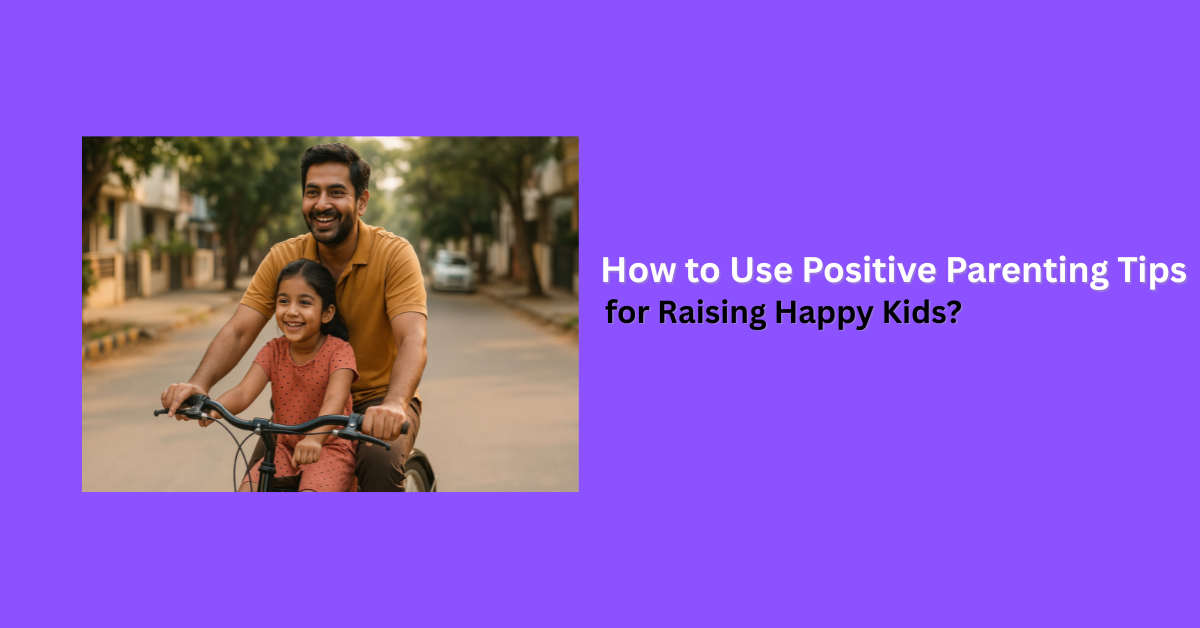Positive parenting is about focusing on love, respect, empathy, and guidance rather than fear and punishment. Instead of controlling children with authority, parents use encouragement and communication to teach life skills.
Parenting is one of the most rewarding yet challenging journeys in life. Every parent wants to raise a child who is confident, responsible, and emotionally strong, but the way we guide them makes all the difference. This is where positive parenting tips can help.
Before that, please enter the details to get a free parenting guide.
Why Positive Parenting Tips Are Important?
Every child looks to their parents as the first role models. When parents use positive parenting, it helps children in many ways:
- Boosts Self-Esteem – Kids who feel heard and respected are more confident.
- Improves Behavior – Children respond better to calm guidance than to yelling.
- Strengthens Family Bonds – Positive communication builds trust between parents and kids.
- Teaches Life Skills – Empathy, responsibility, and problem-solving are learned naturally.
- Creates a Peaceful Home – Reduces conflicts and makes family life happier.
How to Practice Positive Parenting Tips?
Now that we understand why it matters, let’s look at practical ways to practice positive parenting.
1. Communicate with Respect
Instead of commanding your child, talk with them. Listen to their feelings and acknowledge their emotions. For example, instead of saying “Stop crying”, you can say “I know you’re upset, let’s talk about it.” Respectful communication makes children feel valued.
2. Set Clear and Consistent Rules
Children need boundaries to feel secure. Make rules simple and consistent. For instance, if bedtime is at 9 pm, ensure it is followed daily. Consistency helps children understand expectations and feel safe.
3. Encourage Independence
Give your child opportunities to make small decisions, like choosing clothes or snacks. This teaches responsibility and confidence. Over time, they will learn to make bigger decisions wisely.
4. Use Discipline with Empathy
Positive discipline means guiding rather than punishing. If your child makes a mistake, explain why it was wrong and how to fix it. Instead of “You’re grounded for being late”, say “Being late worried me, let’s think of ways to manage time better.”
5. Spend Quality Time Together
In today’s busy world, children need undivided attention. Even 20 minutes of play, storytelling, or talking daily strengthens your bond. These moments reassure children that they are loved and supported.
Quick Positive Parenting Tips to Try Daily
Here are some quick positive parenting tips to try daily:
- Praise effort, not just success.
- Stay calm during conflicts.
- Be the role model you want your child to follow.
- Offer choices instead of commands.
- Use gentle reminders instead of punishments.
- Show unconditional love, even when correcting mistakes.
Real-Life Example of Positive Parenting
Imagine your child throws a tantrum because they want candy before dinner. Instead of yelling, a positive parenting approach would be:
- Stay Calm – Take a deep breath.
- Acknowledge Feelings – “I know you really want candy.”
- Explain Gently – “But eating candy now will spoil your dinner.”
- Offer an Alternative – “Let’s keep it for after dinner, or you can have some fruit now.”
This way, you guide your child with empathy while still maintaining discipline.
Common Mistakes Parents Make (and How to Avoid Them)
Some common parenting mistakes and their strategies to tackle them are given below:
- Overusing Punishment – Fear may stop behavior temporarily but doesn’t teach responsibility. Instead, explain consequences.
- Not Listening to Kids – Children often misbehave when they feel unheard. Listen actively.
- Inconsistent Rules – If rules change daily, kids get confused. Stick to consistency.
- Comparing Kids – Every child is unique. Comparing can harm self-esteem. Focus on individual growth.
- Expecting Perfection – Children learn through mistakes. Allow them space to grow.
Long-Term Benefits of Following Positive Parenting Tips
Read on to know about the long term benefits of positive parenting:
- Emotional Stability – Kids grow up secure and resilient.
- Better Academic Performance – Confidence and discipline help in studies.
- Healthy Relationships – Children raised with respect tend to treat others kindly.
- Life-Ready Skills – Empathy, problem-solving, and responsibility prepare them for adulthood
How KidsCur Can Help?
Parenting is not about perfection, it’s about progress. By following these positive parenting tips, you can create a nurturing environment where your child feels loved, respected, and guided. Remember, children don’t need perfect parents; they need parents who are present, patient, and willing to learn with them.
When you practice positive parenting, you are not just raising children—you are raising future adults who will be kind, confident, and responsible. And that is the greatest gift you can give them. With KidsCur, it is possible. Our app provides all the features necessary for the upbringing of children.
Simplify parenting with our app.
Click on This Link

FAQs
What are the best positive parenting tips?
The best tips include respectful communication, setting clear boundaries, showing unconditional love, and encouraging independence.
Does positive parenting mean no discipline?
No, it means discipline with empathy. Children are taught consequences and guided toward better behavior without harsh punishment.
Can positive parenting work for teenagers?
Yes, teenagers also respond well to respect, open communication, and clear boundaries.

